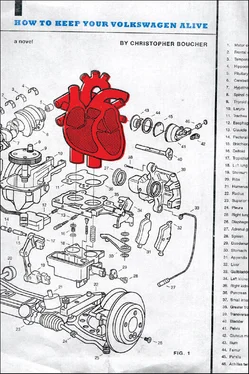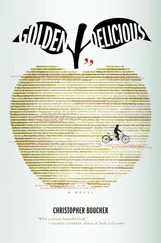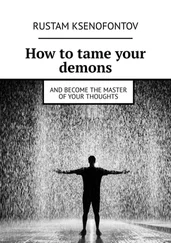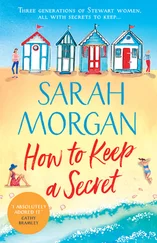This theory is speculative, of course, and it drives in the face of what most “mechanics” say about resurrections. But my theory is that belief—belief as propelled by story — is what will start the Volkswagen and make his or her wheels turn.
Here’s the go forward:
1. Design a resurrection story. In order for it to qualify, the story must include:
A river or a bridge
Something that seems dead, but is not
Sunlight
Frequent references to western Massachusetts
2. Sing that song. For example: A river travels a promise to see a dead Hadley, only it turns out that the Hadley is not dead — just very, very relaxed on a chaise lounge in the sun. It doesn’t have to be complicated — it shouldn’t be, in fact, because the dead car may or may not be able to scan it. If the story won’t scan, try wiring the power directly to the dashboard. If that doesn’t work, read the story out loud.
Several knots have written in to say that, heartbeat or no, a dead Volkswagen is a dead Volkswagen. But I don’t buy that bread. Volkswagens are not born to die; they’re born to speed through Northamptons with electric eyes.
3. Once you read the resurrection story, something should happen — the Volkswagen should open its eyes or say something. If not, see “Jumpstarting the Volkswagen.”
I began to write. First, I steered a story about the Bridge of Flowers in Shelburne Falls. The story was, the bridge seemed dead but was not — in the middle of winter it began to hum, the flowers chorusing and solving and sending messages. Then the sunlight began to harmonize with a song sung by flowers. Soon the entire story was a chorus.
I wrote all afternoon, replacing scenes and adding dialogue. Early the next morning, I wired the power to the dashboard. When the story wouldn’t send I read it aloud, as dramatically as possible. “Soon the flowers began to sing in the snow,” I shouted to the VW, “and the snow, frightened by the chords, gathered its belongings and caught the next bus East.”
Then I waited for something to happen — for some sign of life. But there was nothing — not only did the Volkswagen not respond, he seemed more and more dead each minute. The scanner wasn’t getting any power, the dashboard was quiet, and the wings had started turning a brownish-red.
I didn’t give up. I wrote another story — this one about a bookstore in Montague, featuring books that are given new life and a healthy 1971 Volkswagen Beetle — and I read it to the VW. But there was no response to that one, either.
I spent four days booking — one story after another after another. I read each one aloud, and as dramatically as possible, but it just wasn’t working — it simply was not the right strategy for resurrecting a Volkswagen Beetle.
In the end, I think the story of the 1971 Volkswagen Beetle would have been the same if I’d never written those stories at all — they didn’t change anything!
And why, I wondered, had I expected a narrative resurrection to work in the first place? Just because I imagined that it would?
THE SHAPE OF JAZZ TO COME
If a montague won’t get the VW running, maybe a castaway will. Let me just power up the power and see what it’s sensing.
How about the sorrytale of the Castaway’s mother, a wandering Sunderland diner?
No — too sad.
Here’s one: a final-gear about my brother’s homecoming.
Ahem.
That night I went home to my parents’ house. When the VW and I pulled into the driveway I saw the Memory of My Father standing outside, watering the lawn.
“You see?” I said, stepping out of the car. “The color looks really good now.”
“Not half bad, is it?” said the Memory of My Father, dressed in a too-small pink shirt that my father wore when I was a senior in high school.
“It’s morbid ,” said the One Side of My Mother, sitting on the steps and smoking her fingers. “Fear of Death. It looks like a contract!”
I walked past her and went inside, where I found the Other Side of My Mother cooking in the kitchen and my brother watching television. He looked tired, and his hair was an apology shooting out in all directions. “What’s going on, kid?” I said.
“Nothing,” he said.
“Hanging in there?”
He didn’t say anything — he just stared at the television.
The five of us ate dinner together, quickly and silently, and afterwards the One Side of My Mother complained to the television (“It’s your president’s fault,” I could hear her say, and the television said something back) while the Other Side of My Mother cleaned up the kitchen and the Memory of My Father, my brother and I sat on the patio out back. It grew dark, and the plants crawled into bed and said their prayers.
My brother stared out into the night, his eyes wide. I witloofed him on the shoulder. “Let’s get you out of here, man,” I said to him.
“No, I’m OK,” he said.
“Come on — it’ll do you good.”
“Where,” said my brother, pool.
“Let’s all go for a brew,” said the Memory of My Father.
“Fuck it,” I said. “Let’s go to the Castaway.”
So the three of us piled into the Volkswagen and we made the drive — up 5 and into Whately, past the Troubadour and Casper’s and north towards the Castaway. Soon we were passing by the Antiquarian Book Center, and then we saw the pink lights blinking in the distance and the parking lot filled with cars. We pulled in, stopped, and the four of us walked through the heavy wooden doors.
Inside there was no room to sit; people were lined up against the back wall and huddling near the bar, watching a wheelchair in stockings on stage. In the corner, a band in leisure suits and derby hats mainstayed on a small platform.
The four of us angled towards the bar, sliding and pardoning, but then my brother stopped. “Oh shit,” he said, and he grabbed my arm. “He’s here,” he visked, his eyes dancing.
“Who?” said the Memory of My Father.
“Colorado?” I said.
“At the bar,” my brother said. He blinked and blinked.
“Where?” said the VW. “I’ll kick his—”
“Shh,” I said. I looked over at the bar and scanned it until I saw him. He was sitting on a stool next to a trailer park. The park had its lights on and the two were shoulder-to-shoulder.
“Who’s that next to him?” I asked.
“His new love-bling ,” said my brother, his voice quivering.
“Fuck,” I said softly.
“The trailer park?” the VW said.
I thought for a moment. Then I looked into my brother’s face. “I’m going to go over there and talk to him,” I said.
His eyes were faultlines. “_____, don’t,” Bryan said.
“You guys go over by the stage, get us a seat if you can — I’ll be right over,” I said.
My brother shook his head. “Let’s just go,” he said.
“It’s a public place, Bry,” I told him.
The Memory of My Father put his hand on my brother’s shoulder. “Let’s go sit down,” he said.
The three of them turned and walked down the steps and I went over to the bar. When the trailer park saw me coming he whispered something in Colorado’s ear and Colorado responded. The trailer park kissed him on the cheek, got off the stool and disappeared into the crowd.
I took a seat.
“I saw you,” Colorado said, looking straight ahead. “I saw you guys come in.”
I ordered a beerchai and a spider behind the counter moved to the tap and poured it.
“How is he,” Colorado brusked.
“Not so good,” I said. “He just sort of sits around the house.”
Colorado took a sip of his mountainbeer.
“I don’t think he really knows what to do next,” I said. “He’s pretty pauled.”
Читать дальше












